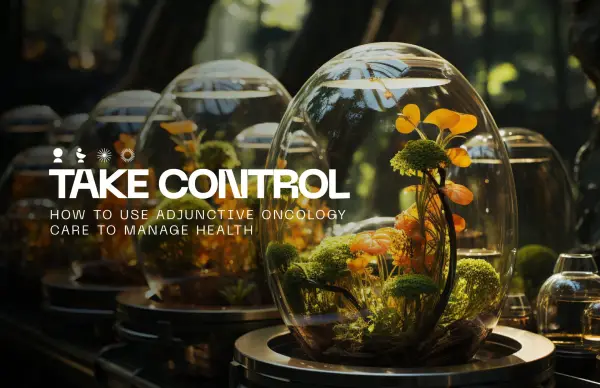Blog
What is adjunctive oncology care?

Contents
Definition of adjunctive oncology care
4 fundamentals of adjunctive oncology care
Managing your health with adjunctive oncology care
As cancer treatments improve, the focus on adjunctive oncology care increases. What does this therapy entail, and how does it help in disease management?
Cancer is a genetic condition characterized by abnormal and uncontrollable cell development. Due to its complexity, this disease often requires long-term treatment. Adjunctive oncology therapy forms an essential part of this medical plan.
Read on to learn about the details of adjunctive cancer care.
Definition of adjunctive oncology care
Adjunctive oncology care is a complementary treatment combined with primary cancer therapy. It’s suitable for all types of cancer and usually happens after an initial medical procedure.
The care is targeted at managing cancer and preventing it from returning. It also helps relieve the side effects of the initial procedures.
Cancer treatments can be challenging, as your system undergoes immense stress. As a result, you may experience adverse impacts from certain therapies. When applied correctly, adjunctive care can solve this issue.
Adjunctive care doesn’t substitute typical cancer therapies, but only complements them. It boosts the efficacy of surgery, radiation, chemotherapy, and other treatments.
Adjunctive treatments enhance your quality of life before, during, and after conventional therapies. They integrate diet, lifestyle changes, supplements, and other essential strategies.
4 fundamentals of adjunctive oncology care
Four factors play a crucial role in the delivery of adjunctive oncology care. They make up the fundamentals of this multidisciplinary cancer-focused therapy.
1. Implementing intravenous (IV) therapy and supplements
Chemotherapy and other cancer treatments cause the accumulation of toxins in the bloodstream. These chemicals can cause numerous adverse effects if left in the body. They may also encourage the return of uncontrollable cell growth.
IV infusions and supplements assist your body in combating the accumulated toxins. They remove these chemicals and ensure you stay healthy after cancer treatment. The therapy helps all patients regardless of their age or the cancer stage.
Medical experts use IV infusions to provide essential minerals and vitamins to patients. They also recommend various supplements to work in tandem with the process.
IV procedures treat the following health conditions:
- Nausea. Some medications and procedures affect eating and sleep habits. These problems may lead to nausea. IV treatments replenish lost fluids and nutrients, easing nausea.
- Fatigue. Cancer patients may experience vitamin deficiencies, nausea, and other conditions. These problems cause fatigue, as individuals struggle to acquire sufficient nutrients. IV infusions boost energy production and alleviate tiredness.
- Dehydration. Nausea, fatigue, and some medications lower the water content in your body. Dehydration aggravates headaches, tiredness, and lightheadedness. These issues make it difficult to recover after treatment. IV infusions solve this problem by restoring your body’s normal fluid levels. They relieve discomfort and aid recovery.
- Constipation. Many patients experience this condition during cancer treatment. IV treatment restores bowel function with antioxidants, hydration, vitamins, and minerals. The procedure enhances mental clarity and energy to boost your overall health.
- Weight loss. Cancer treatment is time-consuming and often leads to mental health problems. Lack of appetite, stress, gastrointestinal disorders, nausea, and pain may also accompany it. These issues result in significant weight loss. IV therapies aid nutrition and hydration, promoting weight gain.
Along with IV infusions, supplements reduce the risk of future uncontrollable cell growth:
- Thymosin Beta 500 may improve immunity. It acts as a natural cancer fighter and prevents unwanted adverse effects.
- LL-37 could aid in recovery from cancer. This antimicrobial peptide helps eliminate a wide range of pathogens
2. Correcting foundations of wellness
Wellness is rooted in certain factors that are the foundations of our well-being. Most experts agree these elements include sleep health, gut health, and energy levels. It’s difficult to achieve optimal health if these aspects are unbalanced.
Adjunctive oncology care enhances cancer treatment by correcting these factors. It optimizes them to help you recover.
Sleep health
Adverse treatment effects may lead to sleep problems in people with cancer. Medications, stress, mental health issues, and long hospital stays are the main causes. Studies suggest up to 50% of patients experience these challenges.
Adjunctive cancer care explores different methods of managing sleep problems. Common procedures for treating these issues are:
- Relaxation therapy
- Cognitive behavioral therapy (CBT)
- Adherence to strict bedtime habits
- Medications
- Addressing underlying issues, like diarrhea, pain, and urinary problems
Gut health
Your stomach contains bacteria and other microorganisms that make up the gut microbiome. These microbes affect your mental and physical well-being. Your nutrition impacts your gut health.
Studies suggest there’s a relationship between your gut health and numerous conditions. Poor nutrition affects immunity, sleep, digestion, the endocrine system, the heart, and more. These problems slow down recovery and may cause recurring issues.
Adjunctive oncology care focuses on improving the major indicators of gut health. Typical methods recommend to:
- Eat high-fiber meals. These foods boost the function of your gastrointestinal system. Their breakdown also reduces the risk of bowel cancer, diabetes, and heart disease. Vegetables, nuts, legumes, seeds, fruits, beans, and cereals fall into this category.
- Eat different types of meals. Don’t limit your food to a particular form. Try various kinds of plant-based meals containing essential minerals, vitamins, and other nutrients.
- Drink plenty of water. The most beneficial fluid for gut health is water. It aids food breakdown, ensuring your body uses nutrients easily. Water also prevents dehydration, a common side effect of cancer treatment.
- Reduce ultra-processed foods. These meals contain a range of unhealthy additives. They have minimal health benefits and may affect your gut. Avoid packaged snacks, ready-made cereals, and other processed foods. Prioritize unprocessed meals, like whole grains, eggs, fruits, seafood, and vegetables.
- Take fermented foods. Yogurt, kefir, kimchi, sauerkraut, and other fermented meals may support gut health.
- Eat polyphenol-rich foods. Enjoy meals with lots of spices, herbs, colorful fruits, and vegetables. Nuts, cocoa, green and black tea, and seeds are also great options.
Energy levels
Cancer treatment depletes physical strength, leading to a frail appearance. Adjunctive oncology care addresses this problem by improving your energy levels.
The most notable tactics are to:
- Conserve your energy for essential tasks.
- Drink lots of water and eat healthy meals to preserve your energy.
- Participate in moderate exercise, like swimming, biking, and brisk walking. The best activities to take part in depend on your health status. Consult your physician before exercising.
3. Working synergistically with treatments to improve outcomes
Adjunctive oncology care isn’t a standalone procedure for treating cancer patients. It’s a supplementary therapy for improving the outcomes of primary treatments. As a result, it’s important to use it along with conventional procedures.
Note the following tips to ensure adjunctive care works synergistically with other treatments:
- Don’t replace conventional cancer therapies with adjunctive care.
- Avoid procedures that may interfere with cancer therapies. Some exercises and herbs may worsen the condition.
- Avoid unproven cancer treatment methods or products, as they may exacerbate your condition.
- Consult your physician before enrolling for adjunctive cancer treatment. Your primary healthcare provider will consider your condition to determine what to do.
4. Managing the side effects of cancer treatment
Chemotherapy and other related treatments kill cancerous cells. While destroying the unwanted elements, these treatments may also affect healthy cells. The damage often affects the hair follicles, mouth, gastrointestinal tract, and bone marrow.
Common side effects of cancer treatment include fatigue, hair loss, depression, and nausea. Some people may have issues with reasoning or remembering things. Adjunctive oncology care helps manage these adverse impacts.
Typical ways to manage these side effects are:
- Use medications to relieve vomiting and nausea.
- Exercise to combat chemo-induced fatigue.
- Wear a cooling cap to reduce the risk of hair loss.
- Wash your hands regularly to fight germs and infections.
- Set reminders or note your daily plans to treat memory loss. Pinealon is a recommended supplement that could help.
- Take prescribed medications to deal with depression.
- Use ice chips to lower the risk of mouth sores.
Managing your health with adjunctive oncology care
Cancer can be challenging to treat, as there’s a risk of recurrence. Take advantage of adjunctive oncology care to deal with this health problem.
This complementary therapy boosts the efficacies of conventional treatment. It also reduces the chance of cancer returning. Adjunctive cancer therapy involves various strategies.
Book a consultation with LIVV Natural to discover the best treatment for your condition. We work alongside conventional cancer therapies to bring enhanced results. Take advantage of our IV Lounge. Ask us about incorporating Thymosin 500 Beta and LL-37 into your recovery plan.
Author: Dr. Jason Phan NMD – Founder of LIVV Natural – Anti-aging – regenerative medicine – peptide therapy


